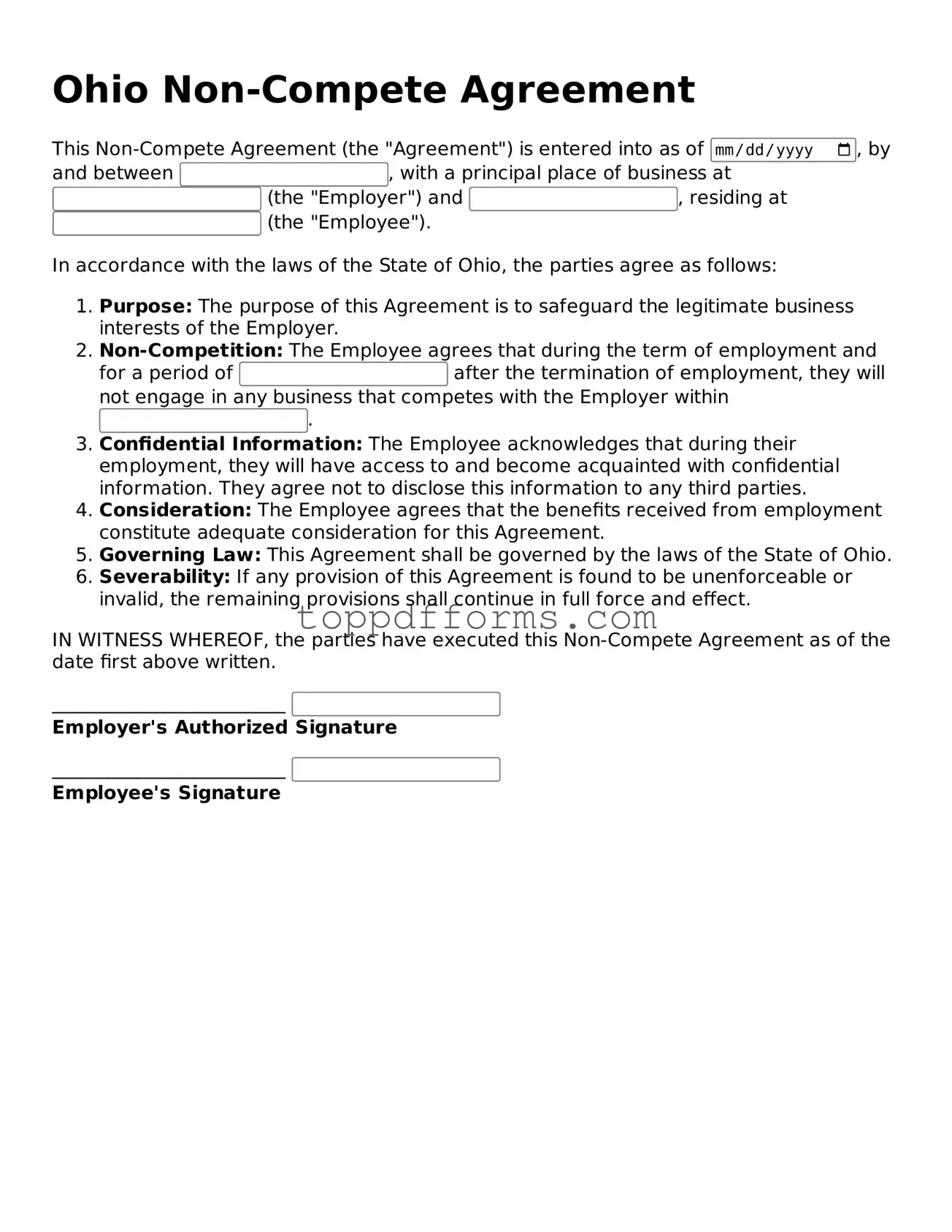Non-compete Agreement Document for Ohio State
Things You Should Know About This Form
What is a Non-compete Agreement in Ohio?
A Non-compete Agreement is a contract between an employer and an employee. It restricts the employee from working for a competitor or starting a competing business for a specified period after leaving the company. In Ohio, these agreements are enforceable as long as they meet certain legal requirements, such as being reasonable in time, geographic area, and scope of activity. The goal is to protect the employer’s legitimate business interests while ensuring the employee can still find work in their field.
How long can a Non-compete Agreement last in Ohio?
The duration of a Non-compete Agreement in Ohio can vary, but it generally should not exceed one to two years. Courts will assess whether the length of the restriction is reasonable based on the nature of the business and the employee's role. If the duration is too long, a court may deem the agreement unenforceable. It’s crucial to strike a balance that protects the employer’s interests without unfairly limiting the employee’s ability to work.
Are Non-compete Agreements enforceable in Ohio?
Yes, Non-compete Agreements can be enforceable in Ohio, but they must meet specific criteria. The agreement must be necessary to protect legitimate business interests, such as trade secrets or customer relationships. Additionally, it must be reasonable in scope and duration. If challenged in court, the burden of proof lies with the employer to demonstrate that the agreement is valid and enforceable.
Can an employee negotiate a Non-compete Agreement?
Yes, employees can negotiate the terms of a Non-compete Agreement before signing. It’s advisable to discuss any concerns regarding the agreement’s duration, geographic scope, or specific restrictions. Open communication can lead to a more balanced agreement that protects the employer's interests while allowing the employee some flexibility in their future employment opportunities. Seeking legal advice before signing can also be beneficial.
PDF Overview
| Fact Name | Description |
|---|---|
| Definition | An Ohio Non-compete Agreement restricts an employee from working with competitors for a specified period after leaving a job. |
| Governing Law | Ohio Revised Code Section 1333.55 governs the enforceability of non-compete agreements in Ohio. |
| Enforceability | For a non-compete agreement to be enforceable, it must protect legitimate business interests and not impose an undue hardship on the employee. |
| Duration | Typically, non-compete agreements in Ohio are limited to a duration of one to two years, depending on the nature of the business. |
| Geographic Scope | The geographic area covered by the agreement should be reasonable and related to the area where the employee worked. |
| Consideration | To be valid, a non-compete agreement must be supported by consideration, such as a job offer or a promotion. |
| Judicial Review | Ohio courts may modify or void overly broad non-compete agreements to ensure fairness and reasonableness. |
Common mistakes
When filling out the Ohio Non-compete Agreement form, individuals often overlook key details that can lead to misunderstandings or legal issues. One common mistake is failing to clearly define the scope of the non-compete clause. Without specific language outlining what activities are restricted, the agreement may be deemed unenforceable. Clarity is essential to ensure both parties understand their rights and obligations.
Another frequent error is neglecting to specify the duration of the non-compete. An ambiguous time frame can create confusion and may ultimately invalidate the agreement. It is important to set a reasonable time limit that reflects the nature of the business and the competitive landscape. A well-defined duration helps to protect both the employer’s interests and the employee’s future opportunities.
People also often forget to include geographical limitations in the agreement. A non-compete that lacks a defined geographic area may be seen as overly broad and, therefore, unenforceable. Specifying the regions where the non-compete applies ensures that the agreement is fair and reasonable, balancing the needs of the employer with the employee's right to work.
Additionally, individuals may not consider the implications of signing the agreement without seeking legal advice. Many people assume that the terms are standard and do not realize that they may be giving up significant rights. Consulting with a legal professional can provide clarity on the terms and help individuals understand the potential consequences of signing the agreement.
Finally, a common oversight is not keeping a copy of the signed agreement. After the form is completed, it is crucial to retain a copy for personal records. This can prevent disputes in the future and serves as a reference point should any questions arise about the terms of the non-compete. Proper documentation is vital for both parties involved.
Other Common State-specific Non-compete Agreement Forms
Do Non Compete Agreements Hold Up in Court - Generally, broader restrictions are harder to enforce than narrower ones.
New York Non Compete Law 2023 - Understanding the fine print can help employees navigate their career transitions.
To facilitate a smooth transaction, it is recommended to utilize a reliable Motorcycle Bill of Sale form template that outlines all necessary details for the sale, ensuring both parties are protected and informed.
Non Compete Agreement Georgia Template - There may be exceptions to non-compete agreements, often based on the reason for employment termination.
